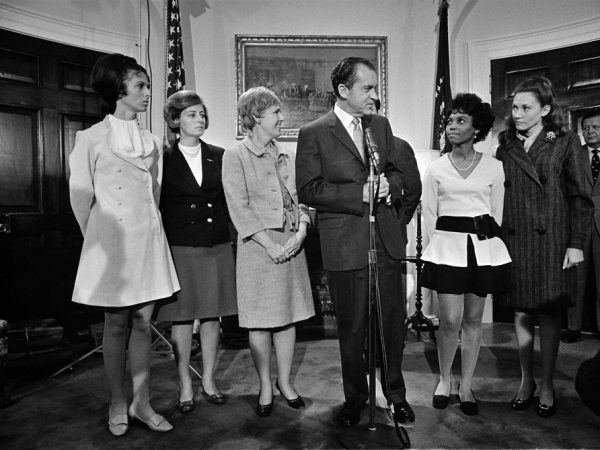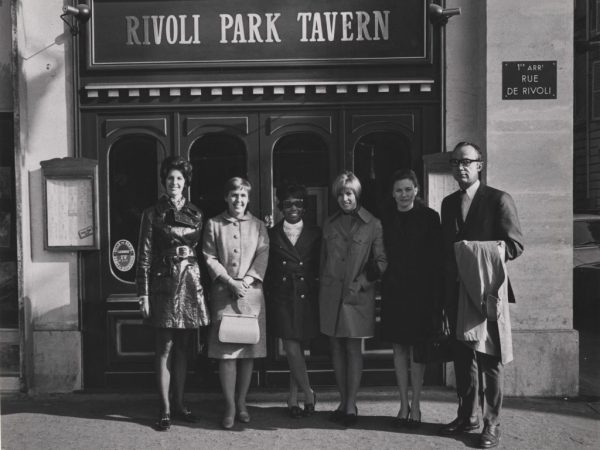“Remember the ladies!”
by Taylor Baldwin Kiland
“I long to hear that you have declared an independency. And, by the way, in the new code of laws which I suppose it will be necessary for you to make, I desire you would remember the ladies and be more generous and favorable to them than your ancestors. Do not put such unlimited power into the hands of the husbands. Remember, all men would be tyrants if they could. If particular care and attention is not paid to the ladies, we are determined to foment a rebellion, and will not hold ourselves bound by any laws in which we have no voice or representation.”—Abigail Adams in a letter to her husband dated March 31, 1776
Remember the ladies.
After two decades of research and writing about the men who still are the longest-held group of POWs in our nation’s history, receiving an email from one of them, Navy Capt. Dick Stratton, in January of 2015, was a pleasant surprise. In it, he advocated for the ladies: “What folks do not realize is that during the Vietnam War, the wives and families had it far worse than we did…. Our families from one day to the next did not know if we were okay or not; they had no confidence that our government gave a damn about us or would ever bring us home….”
He was right.
Eight years of research into the lives of the wives of our missing and captive men revealed to me an epic home front battle, one just as divisive as the war in Southeast Asia. During this tumultuous era when several thousand of America’s military men were captured or went missing during the Vietnam War, a small group of military wives became their champions.
Between 1969 and 1973—when the Paris Peace Accords were signed—these women traveled around the world and to the United Nations, pounding the pavement and their fists in the halls of Congress, the State Department, the Pentagon, and the Oval Office. They did what military family members had never before done: they became the face of international diplomacy. Consequently, their husbands became what prisoners of war had never before been: strategic pawns.

Never had families taken on diplomatic roles during wartime, nor had the fate of our POWs and missing men been a nationwide concern. The roles Coronado POW wives like Sybil Stockdale, Sherry Martin, Chloe Moore, and Shirley Stark played in rallying a nation and a president around the fate of their captive and missing men have been well documented.
What has been less chronicled is the legacy of their work.
American prisoners of war now have enormous value to those who hold them. Today, the United States fights its wars in ways to minimize the potential of capture by the enemy. Planes fly higher. Drones are increasingly used. When there has been just one American captive, the United States government has traded hardened terrorists or a nasty arms dealer in exchange for release. The value we place on just one captive is a quintessentially American one.
And what about the missing men from the Vietnam War? The women pressured the Pentagon to create a permanent government organization whose sole task was to resolve the still-lingering issue of the missing in-action personnel in Southeast Asia. That organization, established in January of 1973, is now called the Defense POW/MIA Accounting Agency, or DPAA. It boasts an annual budget of $130 million and a highly skilled staff of 700 professionals who comb the globe searching for remains from all wars.
It was no accident that the United States ended its longest conflict in 2021, in Afghanistan, without a single POW or MIA. Our nation can still tolerate those killed in action, but not POWs or MIAs. But that has not always been the case. Every other war in our nation’s history has produced thousands of unrecovered missing men: more than 72,000 from World War II and more than 7,500 from the Korean War. Only since the Vietnam War have we truly upheld the promise to “Leave No Man Behind”—made to a handful of military families more than fifty years ago.
On May 2, 2023, a new book I coauthored—the third about our Vietnam POWs and their families I have penned—will be released. In cinematic detail, Unwavering: The Wives Who Fought to Ensure No Man is Left Behind plunges you directly into the political maneuvering the women navigated, onto the international stage they shared with world leaders, and through the landmark legacy they created.
In it, you will meet Mary Ann “Pat” Mearns, a Coronado resident who was raised in Burbank, California. She was a nurse and airline stewardess living in Japan with her husband, Air Force Maj. Art Mearns, and their two small girls, when he was shot down on Veterans Day 1966 while flying a bombing mission over North Vietnam. She became a one-woman lobbyist and international activist, pressing world leaders to force Hanoi to account for America’s missing men. You will also meet Carol McCain, the first wife of the late Sen. John McCain. Born and raised as an only child in Philadelphia, the savvy and tall brunette swimsuit model was the mother of three young children when her second husband was shot down and taken captive as a POW in 1967. She was also gravely injured in a car accident on Christmas Eve 1969, which left her severely disabled for life. You will also meet Candi Parish Ellis, the daughter and daughter-in-law of admirals, barely twenty-three, and the mother of a three-week-old son, Hunter, when her husband, Navy Lt. Chuck Parish, was reported missing in action in 1968. She became a tireless activist on the world stage, traveling to the United Nations, Paris, and Capitol Hill. And you will meet the indomitable Alice Stratton, born and raised in the suburbs of Detroit. Alice was a clinical social worker, living with her three young sons near Naval Air Station Lemoore, in northern California, when her husband, Navy Lt. Cdr. Dick Stratton, was shot down and taken captive in 1967. Because of her professional expertise and experience as a military family advocate, in 1985, she was appointed the first Deputy Assistant Secretary of the Navy for Personnel and Family Matters—a three-star equivalent. Captain Stratton was tickled as he remembered, “I woke up one morning, and my wife outranked me.”

Remember the ladies.
On May 18, 2023, at 7:00 pm, I will be participating in a fireside chat with one of the war heroines, Coronadan, and MIA widow Pat Mearns. Join us on May 18 at 7:00 p.m. at the Coronado Performing Arts Center auditorium at the Coronado High School to discuss our new book Unwavering: The Wives Who Fought to Ensure No Man is Left Behind. Free and open to the public, but reserved seats are available with an advanced purchase of the book at www.coronadohistory.org.




